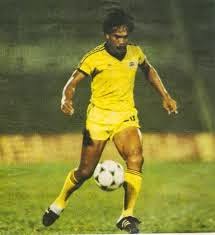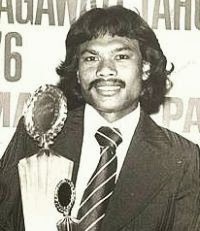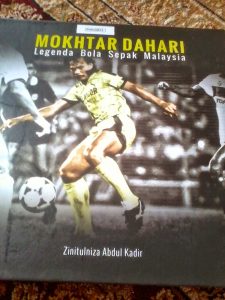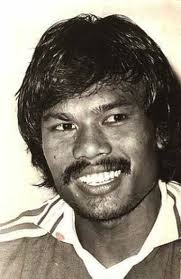The SuperMokh Story
A career that began in his home state. But he quickly went on to achieve national and international fame and honour and become a football legend for his finishing skills, and his modest character and loyalty to Selangor state and the nation.

Home State Roots
Born on 13 November 1953 at Setapak, Selangor Mokhtar was the first born son of couple Aminah Sharikan and Dahari Abeng.
Even as a young kid, Mokhtar showed evidence of his future football prowess. A sports natural all rounder he represented his school, Sekolah Rendah Jalan Kuantan in badminton, football, table tennis and sepak takraw.
Following his family’s move to Kampung Pandan in 1964, Mokhtar continued his football development by playing with friends at the neighbourhood football field on a daily basis.
A bigger change took place when he attended secondary school at Kuala Lumpur’s Victoria Institution. The new school presented Mokhtar with a change in environment and exposed him to a different sporting circle comprising inspiring educators and team mates.
Playing for the school team he honed his deadly striker skills early and helped the team win state level competitions. This brought him to the attention of the state football authorities and helped to launch a professional career in football which began almost immediately after he left school in 1968.

It was a career that began in his home state Selangor. But he quickly went on to achieve national fame and honour and become a football legend for his finishing skills, and his modest character and loyalty to Selangor state and the nation.
Mokhtar was only 19 years old when he first played for the national team in an international game, with his first game was against the Sri Lanka team in 1972. He helped Malaysia to win bronze in the 1974 Asian Games and two gold medals in the Southeast Asian Games in 1977 and 1979 respectively. He scored double winning goals for 2–0 Malaysia League XI against Arsenal F.C. in a friendly game in 1975 which led to rumours of the English top clubs’ interest in him.
After the game, he had an offer from one of the European giants, Real Madrid CF, but declined to join because of his patriotism. Known for his strength, speed and accuracy, Mokhtar was named the best Asian striker by World Soccer magazine when he was 23 years old.
Mokhtar once scored a goal for Malaysia from the halfway line beating the English keeper through an incredible shot in a 1–1 draw against England B in 1978. In that goal he practically dribbled past half of the opposing team coached by Bobby Robson.
In all, he scored 86 goals in 131 international matches for Malaysia, and helped the team reach its highest ever Elo ranking of 61 in 1977. Mokhtar was both the most capped and all-time top scorer for the Malaysian national team and, although not recognised internationally, is considered to have the third most international goals of any forward, inferior only to Cristiano Ronaldo of Portugal and Ali Daei of Iran.
Career Successes

Selangor FA
- First Division (1): Champion: 1984
- Malaysia Cup (10): Winner: 1972, 1973, 1975, 1976, 1978, 1979, 1981, 1982, 1984, 1986
- Charity Cup (Sultan Haji Ahmad Shah Cup) (2): Winner: 1985, 1987
International
Winners: 1973, 1974, 1976, 1979
Runners-up: 1981
Bronze Medal: 1974
Individual
- National Sportsman Award 1976
- AFC Century Award 1999
- World Soccer: The Best Asian Striker 1975
Mokhtar in his own words
“I live and die for Selangor”
“If you’re ashamed to stand by your colours, you better seek for another flag.”
“3 perkara untuk menjadi pemain bolasepak berjaya, DEDIKASI, DISIPLIN dan USAHA. Jangan mudah putus asa”
Legacy
- The Mokhtar Dahari Community Square (Dataran Komuniti Mokhtar Dahari), a community hall located at Kampung Pandan, Kuala Lumpur was named after him where Mokhtar used to stay, occasionally playing football there.
- Gelanggang Mokhtar Dahari (Mokhtar Dahari Futsal Court) located at Putrajaya Futsal Complex in Putrajaya.
- Mokhtar Dahari National Football Academy (Akademi Bola Sepak Negara Mokhtar Dahari) located at Gambang, Pahang was established on 10 April 2014.
- The Shah Alam-Batu Arang Highway connecting Shah Alam and Puncak Alam was renamed Persiaran Mokhtar Dahari in 2014.
- In 2014, Google celebrated his 61st birthday.
- There is also a theatre showcasing his legendary football career in Istana Budaya called “Super Mokh”.
References
https://www.nst.com.my/lifestyle/pulse/2018/07/390573/supermokh-remembering-our-greatest-footballer
R.D. Selva, et. al. Sports Flame, Stories Never Told Before, Percetakan SM Sdn. Bhd.
Ordinary Mokhtar
By Tengku Zarina
Most people remember my husband because he was extraordinary – a legendary football player of his time, gracing the sports arena , sending fans into ecstasy with his sublime goal- scoring touches.
He was worshipped by his fans for his God-given talents. I have watched from the stands , how the stadium would wait in anticipation whenever he took the ball, and would erupt when he sent it crashing into the back of the net.
But as his wife, I have loved and revered him for being the simple and ordinary man that he was. I have cherished the ordinary moments with him. They were just too precious to me, and I am thankful to God for this..
In our bewildering journey of a challenging life as a football celebrity, I have learnt to see him for what he really was – not a football icon, but a husband, a father, loving and well loved.
What touched me dearly was when I fondly recall about it now, is how Mokhtar would always talk to me about football, share his dilemmas or strategies, when I was no expert. It made me feel good that he valued my opinions, my input, and turned to me for support when he could have done that with those who were trained in the mechanics of the game. I wasn’t a ‘ football widow’ I was never left behind as he pursued his career and his love for the game.
I would help him to structure his points and would offer him ideas whenever he was invited by universities to give talks to aspiring students. I have never meddled with his career or told him to quit football, no matter how hard it was on me or on him.
For, I knew that it was his passion , and he was inherently born to do what he does.. Whenever he comes to me all battered black and blue by the stresses of his football life, I would say “Be patient, there are always ups and downs”.
I remember my husband most vividly for the good father that he was. Whenever he got time off from the rigorous football schedule he was on, he would spend it with his children.
He would pamper them and give them their baths. He was also an exceptional husband, never hesitating to help around the house.
He particularly enjoyed certain chores like mopping the house, and cleaning the bathrooms. But he would jokingly ( or seriously ) tell me that he would never hang out the clothes because then our neighbours would make conclusions that he was being queen controlled.
Now so many years have passed and I still see Mokhtar in the three children that we have – seeing glimpses and sparks of him in their personality and the way they live their lives.
The virtues that he had passed down to our children was aplenty, like compassion and empathy.
The children used to get upset when they heard other people trash-talking their father, but Mokhtar would respond by asking , “Are you proud to have me as your father? In order to be good at something and famous, you must be willing to be criticised. Try to be empathetic and take pity on the person who is name-calling me. We must always be compassionate even to these people”.
I am forever thankful to God for picking me to have the privilege of knowing Mokhtar for what he truly was – away from the lenses of the public – his private beautiful brilliance of the man that he was.
Source: R.D. Selva, et. al. Sports Flame, Stories Never Told Before, Percetakan SM Sdn. Bhd.’ pp.208-09
